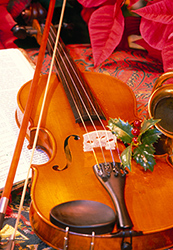-
Lessons & Carols 2017: J.S. Bach’s Magnificat
- Posted on December 1, 2017
- by Nancy
- in Community, Latest News, Spire link, Worship
- Comments Off on Lessons & Carols 2017: J.S. Bach’s Magnificat
 Magnificat, BWV 243 [1723-33], by Johann Sebastian Bach
Magnificat, BWV 243 [1723-33], by Johann Sebastian Bach
Sunday, December 17, 2017, 10:00 AMBach is thus a terminal point.
Nothing comes from him;
everything merely leads to him.—Albert Schweitzer, J.S. Bach, Vol. 1, 1908/1911
Please join us for First Congregational Church’s annual Festival of Lessons and Carols, a beloved tradition from England wherein God’s word is proclaimed and contemplated in a special sequence of readings, prayers, choral anthems and congregational carols and hymns.
The Festival of Nine Lessons and Carols is most affectionately connected to King’s College in Cambridge, England, where it has graced the Chapel on Christmas Eve since 1918. The service was first broadcast in 1928 and, with the exception of 1930, has been broadcast annually, even during the Second World War, when the ancient glass (and also all heat) had been removed from the Chapel. Sometime in the early 1930’s the BBC began broadcasting the service on the World Service. It is estimated that today there are millions of listeners worldwide. It has since been adapted and used by churches and schools all over the world.
In the Festival of Nine Lessons and Carols, we weave together scripture, poetry and song, calling on readers and musicians from all ages and stages, and trace a spiritual progression that carries us from prophecy to fulfillment, from Old Testament foretelling to New Testament celebration of the birth of Christ.
As a part of this year’s Lessons and Carols (and as a final nod to the 500th Anniversary of the Reformation!), the Senior Choir will present Johann Sebastian’s Bach’s Magnificat in D-Major, BWV 243. The extraordinary impact of Bach’s great choral works derives essentially from his remarkable ability to balance, yet at the same time to exploit to the full, the spiritual and dramatic elements of each text, whether it be one as concise as the Magnificat or as monumental as the St. Matthew Passion.
“Concise: marked by brevity of expression or statement: free from all elaboration and superfluous detail.” With this Merriam-Webster entry, it is clear to me that concision embodies the soul of one of Bach’s most beloved cantatas, the Magnificat. It is a work of pulsing energy, lyrical tenderness and stirring utterances.
The text Bach chose, Luke 1: 46–55, is based on words attributed to Mary on learning both of her pregnancy and its significance to humanity. This young woman boldly accepts God’s monumental call and radically suggests a critical shift to the social order:
He has cast down the mighty from their thrones. He has lifted up the lowly. He has filled the hungry with good things and the rich he has sent empty away.
There are no recitatives in the Magnificat. Instead, each of ten verses receives extended treatment, the chorus and soloists supplying appropriate emphasis to this rich canticle text. Each movement is a marvel of compositional economy and perfect expression.
In 1723, Johann Sebastian Bach travelled with his new wife of two years, Anna Magdalena, and their five children to assume his new post in Leipzig. In his first year there, he made the unprecedented decision to produce 40 new cantatas and rework more than 20 reworked pre-Leipzig pieces (a new cantata for every Sunday and feast day of the ecclesiastical year). Out of this compositional fertility came the Magnificat in E-flat for Christmas. Ten years later he revised it and transposed it into D, a much brighter and more satisfactory key for singers and instrumentalists alike. And that is the version you are hearing today!
With the Senior Choir, a chamber orchestra (strings and oboe) and our own Jeffrey Mead at the organ, we will joyfully celebrate the season of Advent and invite you to join us! If you would like to participate with us for this special event, please contact Jane Ring Frank, Minister of Music and Worship Arts.
If you enjoyed this article please consider sharing it!










